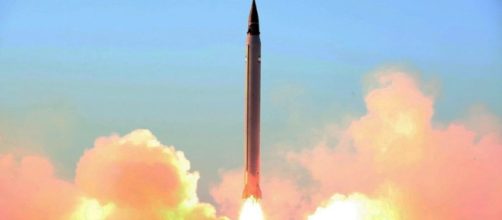120 countries were at the United Nations this week where they held a debate to draft a treaty to ban nuclear weapons. South Africa, Sweden, and Mexico were among those who were there to support the treaty but China, Russia and the U.S. (and reportedly 40 other countries) did not participate. It was also the U.S. which specifically took a stand to boycott the treaty via President Trump's appointed U.S. Ambassador to the United Nations Nikki Haley, who said on Monday that all 40 countries would like to have a ban on nuclear weapons but could not support the fact that "bad actors" were able to have them while the good countries who want to keep peace and safety were not allowed.
Nikki Haley was reportedly joined by 20 ambassadors from Britain, France, and South Korea -- to name three -- who were among those to oppose it. Last December, the UN General Assembly began their effort for the "total elimination" of nuclear weapons by adopting a resolution. When they took a vote, 113 were in favor, 35 were against it and 13 countries abstained. At the time it was the Obama administration that opposed the resolution, even encouraging NATO members to not take part in what would become a legally binding treaty. While both those who are for and opposed have referred to North Korea's actions to test out nuclear missiles as the threat, those for the treaty felt that because of
At the time it was the Obama administration that opposed the resolution, even encouraging NATO members to not take part in what would become a legally binding treaty.
While both those who are for and opposed have referred to North Korea's actions to test out nuclear missiles as the threat, those for the treaty felt that because of North Korea and the presidency of Donald Trump, a legally binding treaty was required.
Tired of waiting for the U.S.
Pakistani-American physicist, nuclear expert, policymaker and research scientist at Princeton University Zia Mian was on Democracy Now! on Thursday, where he spoke about the decision to boycott the treaty. In his interview, he said that the story wasn't that the United States was leading a boycott but that after 70 years of trying to get the U.S. and other nuclear powers to keep their promise to get rid of nuclear weapons, the international community had decided to put a treaty together and make "nuclear outlaws" of those who are not with them.
He said that it's taken years and years to build a coalition for last year's mentioned resolution, but also went further in recalling when the Obama administration demanded that NATO allies not support the resolution, saying that a classified memo was sent to them with the U.S.' demands, even threatening them if they voted for the resolution.
The host of Democracy Now! Amy Goodman, quoted Donald Trump when he said that "If countries are gonna have nukes, we're gonna be at the top of the pack," and asked Mian what his response was to the quote and to what Nikki Haley said about "bad actors." Mian said that the UN General Assembly could not wait for the "bad actors" to stop making nuclear weapons before passing such laws.
He then made a comparison with slavery saying that if one had waited for slave owners to act first, nothing would have been done. China, India, and Pakistan abstained last year and much like before; it was believed that nuclear nations against the resolution would come back around under some pressure from the treaty. Mian said that this is the first time in 70-years there has ever been a treaty negotiation to ban nuclear weapons.
Donald Trump's nuclear weapons view
There has been much debate about Donald Trump's presidency triggering trade wars and an arms race which would include nuclear arms, because Trump has said that if other countries are going to have nuclear weapons than the United States needs to have the most.
Mian said there is a mindset in America that if they have more weapons than everyone else, they can maintain a decisive advantage over every other state, which he says is what drove the arms race with the Soviet Union. He said that there are currently nine nuclear weapon states and that even those who are for the treaty, and even capable of making them do not want nuclear weapons to be their future. Here is the complete interview with Zia Mian about the treaty.

